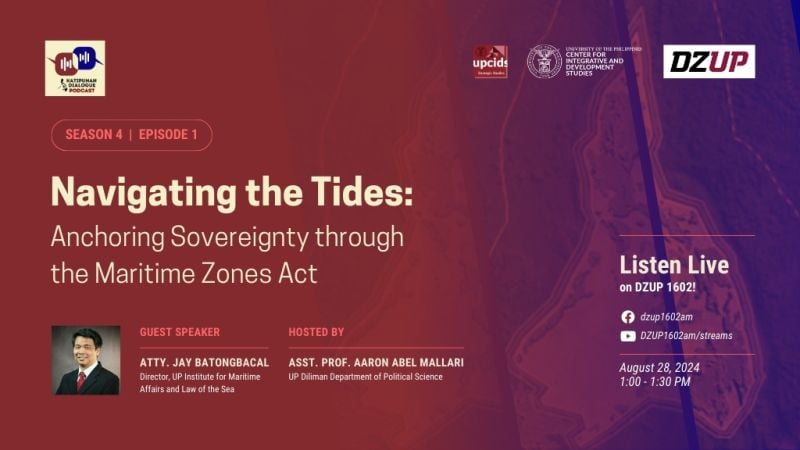Listen: ‘Navigating the Tides: Anchoring Sovereignty through the Maritime Zones Act’ | A Podcast Episode

The Strategic Studies Program of UP CIDS and DZUP 1602 launched last August 28 the fourth season of the Katipunan Dialogue Podcast with the first episode, Navigating the Tides: Anchoring Sovereignty through the Maritime Zones Act, which talks about the challenges and implications of the bill on the global maritime community and the Philippines’ national defense and foreign policy in light of rising tensions in the West Philippine Sea.
You may listen to the episode via DZUP’s Facebook and YouTube.
Episode Topics
The episodes centers on the following questions:
-
- What are the proposed Act’s key provisions, and how does it strengthen existing statutes that uphold the country’s sovereignty and territorial integrity?
- As a domestic measure, what is/are its impacts on the global maritime community?
- What actions can we anticipate from China in response to this latest development? How can the Philippines leverage the proposed Act to respond diplomatically to China’s hostilities?
- Are there challenges and barriers to implementing and exercising the Act to its fullest potential?
- Are there alternative methods aside from the domestic implementation of the proposed Act to uphold our territorial claims that would be more binding within the international realm?
- How will this measure pave the way for the Blue Economy Bill, Archipelago Sealanes Bill, and other maritime-related legislation?
The Katipunan Dialogue Podcast is produced by the Strategic Studies Program of the Center for Integrative and Development Studies, University of the Philippines, in partnership with DZUP 1602.. which is the University of the Philippines’ radio station housed and managed under the College of Mass Communications.
View episode credits and production staff.
You can also listen to previous episodes of The Katipunan Dialogue Podcast on its official Spotify account.
Guest Speaker
Dr. Jay L. Batongbacal is a lawyer, a Professor at the University of the Philippines College of Law, and the Director of the Institute for Maritime Affairs and Law of the Sea. He was the legal advisor to the Philippines’ delegation before the Commission on the Limits of the Continental Shelf in accordance with the United Nations Convention on the Law of the Sea (UNCLOS) that successfully pursued the Philippines’ claim to a continental shelf beyond 200 nautical miles in the Benham Rise Region. He holds Political Science and Law degrees from the University of the Philippines as well as a Master of Marine Management and a Doctor in the Science of Law, both from Dalhousie University (Canada). He has worked extensively on maritime research, consultancy, and teaching since 1997. He has completed fellowships at the National Taiwan Normal University and the US Naval War College. He currently teaches courses in maritime law and property law (From the UP College of Law website.)
Host
Mr. Aaron Abel Mallari is an Assistant Professor at the Department of Political Science, College of Social Sciences and Philosophy (CSSP), University of the Philippines Diliman (UPD). He holds a BA and MA in History from the University of the Philippines. He obtained a double degree from the European Masters in Global Studies (EMGS) Program through an Erasmus+ scholarship that enabled him to study at the Ghent University in Belgium and the University of Vienna in Austria. Presently, his research pursuits focus on the broad history and development of international drug policy, transnational crime, and Southeast Asian studies, with an inclination toward applying and thinking about postcolonial and decolonial theorizing and methodology. (From UP Diliman Political Science website).
Queries and Organizer Information
For queries, please email: [email protected]
The Strategic Studies Program is one of the Research Programs of the Center for Integrative and Development Studies, the policy research unit of the University of the Philippines. Learn more and download SSP policy papers for free.